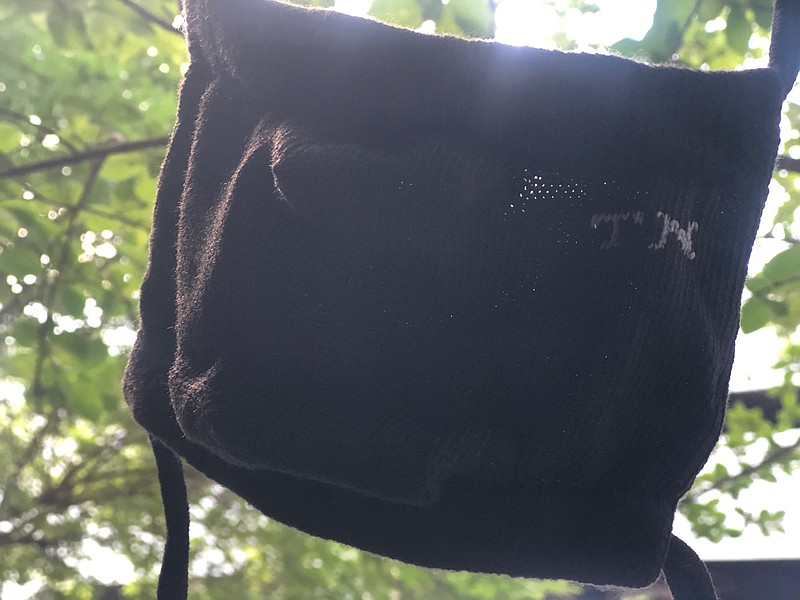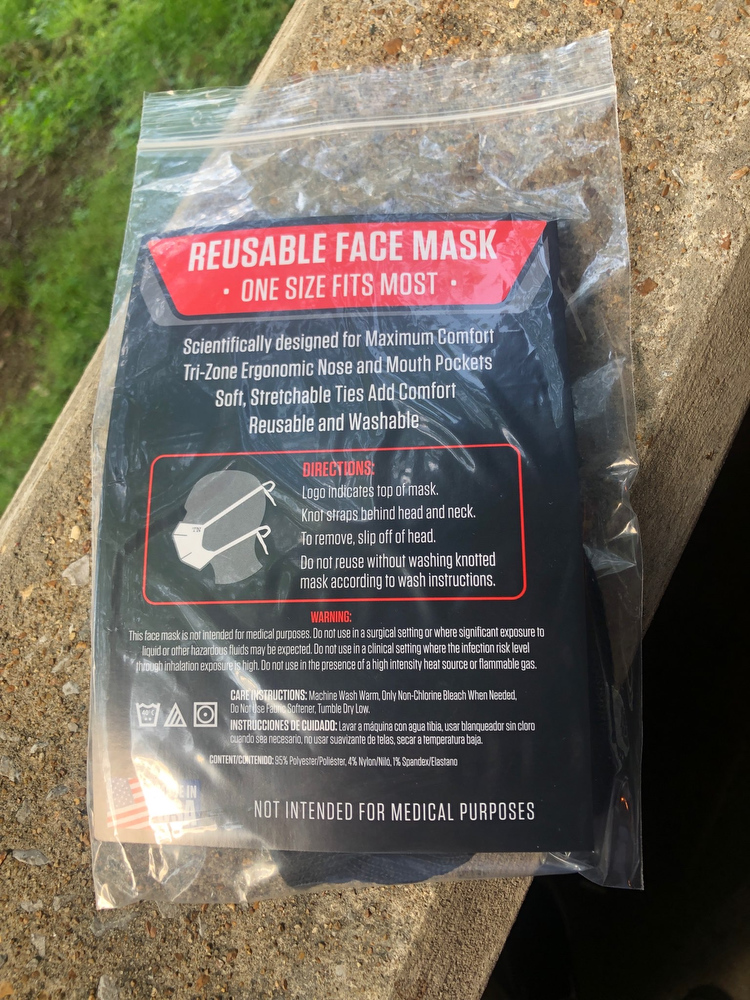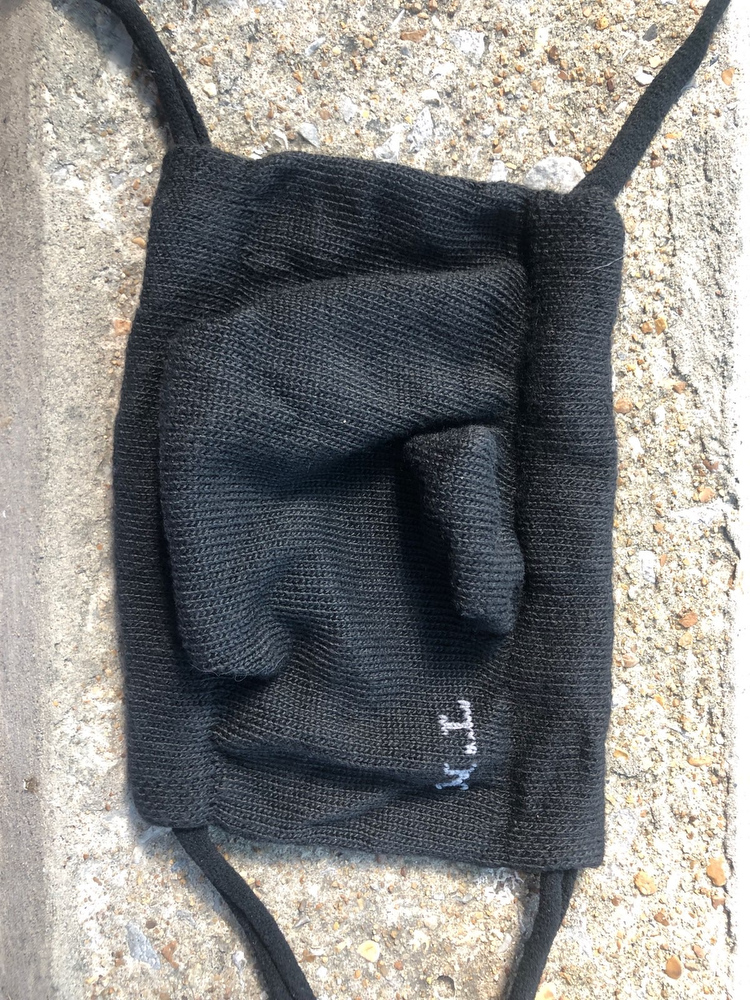Tennessee's first round of 5 million face masks reached county health departments for distribution this week, but some people are questioning whether the material is up to snuff.
Gov. Bill Lee's Unified Command group purchased the masks from Renfro Corp., a Mount Airy, N.C. global designer and distributor of legwear products with a manufacturing and distribution facility in Cleveland, Tennessee.
The Hamilton County Health Department received 14,760 free face coverings from the governor's group on Wednesday, according to a health department spokesman. An estimated 10,000 of the masks had been sent to various locations for distribution as of 4 p.m. Thursday.
The masks are based on the design of the Nightingale mask, recently created in Winston-Salem, N.C., by a team of researchers and medical experts at Wake Forest Baptist Health.
Folks are picking up Gov Lee’s masks from the health dept. Package says not for medical use. A friend picked 1 up and said it looks like somebody cut a sock in half it’s very porous and I can see through it. It’s like trying to keep chipmunks out of your garden with chicken wire. pic.twitter.com/0VZnfc9X6f
— Gloria Johnson (@VoteGloriaJ) May 6, 2020
Dr. Bill Satterwhite, chief wellness officer at Wake Forest Baptist Medical Center, said the team started working to make more face masks due to the shortage of personal protective equipment and a push to outfit everyone in the city with their own mask as a way to prevent the spread of COVID-19.
The hospital linked up with Renfro because both organizations have an office in Winston-Salem's Innovation Quarter.
Most face masks are "cut and sew" masks, but Renfro is a knitting company, Satterwhite said. When the two began to collaborate, Satterwhite said, the hospital team's experience wearing masks was combined with Renfro's manufacturing capabilities.
"We tried to make the best overall mask that could be best mass produced for the community," Satterwhite said. "Surgical masks and other things have a specific context and are not necessarily designed to be worn a long time. We wanted the mask to closely fit and 'seal' as well as it could around somebody's face."
He said fit is important for function and comfort. The team designed a breathing pouch in the front that provides room for the nose and mouth and straps that are adjustable behind the head rather than elastic over the ears. It's also washable.
"Once we start thinking about wearing masks all the time, comfort matters a lot," he said. "There's a lot of thought put into this mask."
Unlike the Nightingale, which retails online for $180 for a pack of 24 ($7.50 each), Tennessee's face mask cost the state $1.65 each, according to spokesman Dean Flener. That's because while the design is the same, the material is different.
That cost-cutting measure is catching some flak from people on social media, including state Rep. Gloria Johnson, D-Knoxville.
Johnson said she was glad to hear that Lee was working to get masks to people who didn't have them, but then she had a constituent reach out to her after getting one from the health department Wednesday.
"He looked at them and said he could see through it. It looks like somebody cut a sock in half - it's very porous," Johnson said. "He said, 'It's like trying to keep chipmunks out of the garden with chicken wire.'"
Johnson said she hasn't seen or felt the masks in person, but people have sent her lots of photos.
"I feel like we're cheating the folks who have the least resources," she said. "I guess if it's the best you can get, it may be better than nothing, but I'm not sure how much better. My concern is, were they aware that this is what they were getting?
"The governor is giving you a mask, you think that's going to be protective, and that's concerning to me that maybe these aren't the most protective masks. When you can see light through them, that's a problem, and that's before you've even stretched them out across your face," Johnson said.
Kelly DeMeester, vice president of innovation and strategy for Renfro Corp., said that the difference in material was in order to meet the needs and budget of the state.
"The state of Tennessee requested 5 million masks with a short timeframe, and Renfro produced a mask to meet this need. As the largest sock company in North America, we're proud of our team's ability to manufacture masks that will help residents of Tennessee," DeMeester said in an email.
The Unified Command Group received a shipment of 400,000 masks this past weekend from Renfro, Flener said in an email. Another 600,000 masks will be delivered from Renfro this weekend, and then 1 million in weekly shipments thereafter until the order reaches 5 million.
State expenditures made to support the public health response to COVID-19, such as the purchase of the Renfro masks, are eligible for reimbursement through the federal Coronavirus Relief Fund, he said.
"The Renfro masks are made with a terry polyester material with Lycra blend tie straps. The material also allows for easier breathing by the user, which is also CDC recommendation. The masks are washable, reusable and treated with Silvadur, a non-toxic silver antimicrobial good for 25 industrial washes. The mask is contoured for fit and to provide less movement and gaping at the nose bridge and eyes," he said.
"Neither this mask, nor any cloth face mask, is intended for medical use. Cloth face coverings are meant 'to slow the spread of the virus' by interfering with the release of saliva droplets that could contain viral material," Flener said. "Therefore, cloth face coverings are to help prevent possibly transmitting the virus to others, as the CDC indicates."
Tennesseans should still observe social distancing and public gathering guidelines when they are out in public even when wearing a mask, he said.
The remainder of the masks in supply at the Hamilton County Health Department are available for pickup at the health department's east and west entrances in the circle during hotline hours, Monday through Friday from 8 a.m. to 6 p.m., Saturday from 10 a.m. to 3 p.m, and Sunday from 10 a.m. to 2 p.m.
For details, contact the department's COVID-19 hotline at 423-209-8383.
Staff writer Andy Sher contributed to this story.
Contact Elizabeth Fite at efite@timesfreepress.com.


